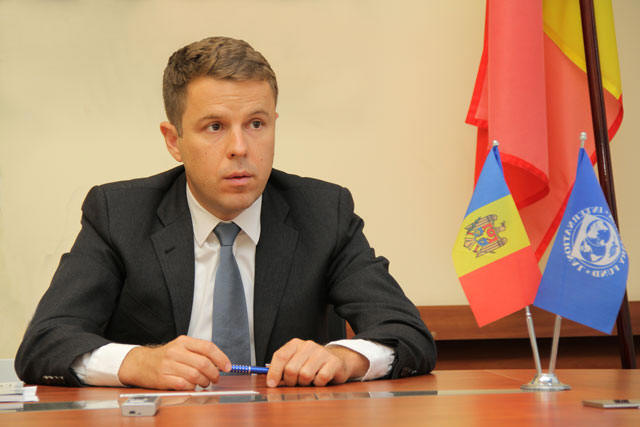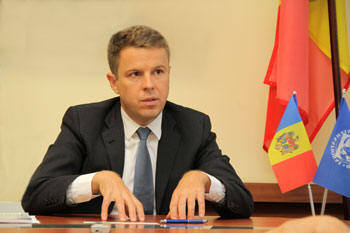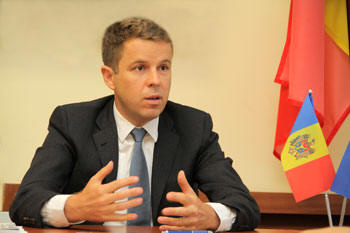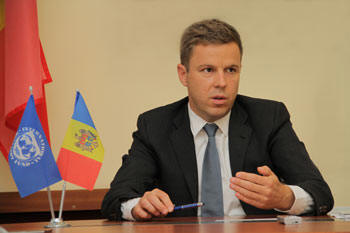
Profit Magazine No.
7-8 (261),
July-August 2018Interview with Volodymyr Tulin, IMF Resident Representative in Moldova
NBM, government, parliament work as a team
Margareta MOCREAC | IMF & Moldova

Moldova's government,
parliament and the National Bank (NBM) have showed that they have the
ability to work as a team when it comes to delivering on commitments
taken under the IMF supported program
IMF Resident Representative in Moldova, Volodymyr Tulin,
believes. In his opinion, Moldova's authorities deserve to be commended
on their team effort. In an exclusive interview with Profit magazine on
July 17, Volodymyr Tulin spoke about the IMF-Moldova cooperation and the
situation in the banking sector.
Profit: Mr. Tulin,
Moldova's three-year program with the IMF (November 2016-November 2019)
is at mid-term. What could you say about the implementation of the
program so far?
V.T.: The Moldovan
authorities remain firmly committed to the comprehensive program of
reforms that they developed to strengthen the economy and address key
vulnerabilities. Generally speaking, the progress thus far indicates
that the program remains broadly on track, macroeconomic stability has
been secured, and the economy continues to strengthen. That said, a good
number of milestones remain to be achieved in the second half of the
program. It is therefore vital to stick with strong commitment to sound
policies and good economic governance to reinforce the progress that has
been achieved and raise Moldova's economic prospects.
Profit: On 29 June,
the Executive Board of the IMF completed the Third Review under the
Extended Credit Facility (ECF) and Extended Fund Facility (EFF), a step
that made available about 33.8 million dollars for Moldova. Does it mean
that the IMF is fully pleased with the actions taken by the Moldovan
authorities to implement the memorandum?
V.T.: Since the
completion of the Second Review in December of last year, the Moldovan
authorities have taken important actions to implement the next set of
policy commitments under the program. On the basis of staff-level
agreement reached in March this year, and satisfactory implementation of
agreed prior actions, the staff of the IMF and subsequently the
Executive Board of the Fund have supported the completion of the Third
Review. Of course, we have to be clear that strong efforts are still
needed to further improve governance, complete the repair of the
financial system, and also undertake more decisive action to recover
stolen assets.
Profit: Which of the
commitments that Moldova still has to fulfil look rather difficult, from
the government's point of view?
V.T.: You should
better ask the government. But from our standpoint, the type of
arrangement that Moldova has with the IMF, a so-called extended
arrangement, aims to help countries implement comprehensive programs of
structural reforms that address deep institutional or economic
weaknesses, in addition to policies that rebuild and/or maintain
macroeconomic stability. This program is built on reforms that require
time, strong effort, and are imminently difficult. So, I would say that
by design of this arrangement, there are no commitments or objectives
that are even meant to be easy.
Profit: Moldova's
authorities show steady confidence as regards the fulfillment of the
conditions stipulated in the program with the IMF. Does the IMF share
this confidence?
V.T.: Although, as I
said, a lot has been achieved and the authorities are confident in
delivering on policy commitments, we are not yet at the point where we
can consider this progress as irreversible. For that, political
commitments are vital to the continued successful implementation of the
program. It is important that prudent policies are maintained and
reforms continue to be advanced in the remaining program period. For
example, it would be essential to avoid budget overruns ahead of the
parliamentary elections.
Today, some
institutions are more insulated from political interference than in the
past, including as a result of reforms undertaken under this program.
For instance, the NBM today is more protected from political or outside
interference than before, so this helps instill more confidence.

Profit: How would
further cooperation with the IMF look if the government successfully
fulfils the current program with the IMF by November 2019? But if not?
V.T.: Needless to
say, the Moldovan authorities still have a huge amount of work ahead to
deliver on improvement of incomes and living standards of the people.
Better governance and institutions hold promise to deliver on
macroeconomic stability and the much-needed productivity growth, human
development, capital investment. The Fund is well-equipped and always
ready to help, be it in a context of program support, technical
assistance, or periodic surveillance of the economy and the financial
system in the absence of a program arrangement. So, it will be up to the
authorities to choose the mode of engagement with the Fund.
Profit: How would
you assess the tax and budget policy currently implemented by Moldova's
Ministry of Finance?
V.T.: The authorities
have clearly focused on improving revenue performance. The tax
administration reform initiated in 2016 has supported the increase in
tax compliance, contributing to strong growth of corporate income tax
and VAT in 2017 with strong performance also continuing this year.
Customs have also shown strong revenue performance. While the steps
taken are wide-ranging, one notable achievement is the unification of
the main state and territorial tax inspectorates under the single entity
of the State Tax Service. But there is still work underway to improve
tax administration. For example, there are more revenue gains that
improvements in IT infrastructure and electronic processes can bring.
Better tax policies, such as to address "envelope wages", also offer
revenue potential. With regard to the budget policy, the cause for
concern has been, however, on the expenditure side. Under-execution of
investment spending often due to uncertainty or delays at all stages,
from project selection to implementation, does not bring comfort. Given
the election year, care is needed to manage the wage bill and avoid
budget over-runs.
Profit: What about
the monetary policy implemented by the NBM? Does the IMF have any
comments or suggestions?
V.T.: In our view,
the monetary policy should remain focused on anchoring inflation at
NBM's inflation target of 5 percent. Even though inflation is expected
to decline further in the coming months, NBM's current policy setting is
appropriately focused on the inflation expected in 2019 and even beyond.
Via the series of
interest rate cuts during 2016-2017, the NBM has responded appropriately
to receding inflation pressures. But it hasn't been an easy task to
calibrate monetary policy given the incomplete rehabilitation of the
financial system and thereby a weakened policy transmission. At the
moment, policy setting appears appropriate, and the NBM is monitoring
the inflation outlook closely. Finally, there is still scope to improve
operational capacity of monetary policy making, reinforce internal and
external communication, and improve coordination across agencies.
Profit: Moldova's
national currency, the leu, appreciated by about 14 percent versus the
dollar in 2017. How good or bad was this for Moldova's economy? What
would the IMF's recommendations on this issue be?
V.T.: For Moldova,
like essentially for any small open economy, a flexible exchange rate
regime is a backbone of economy's ability to cope with external shocks.
Also, at the end of June, NBM's international reserves have reached a
historically high level, which is more than adequate for precautionary
purposes. So, our advice is to continue to limit intervention to
smoothing of excessive exchange rate volatility and not resist movements
driven by fundamentals, particularly when they are improving.
That said, real
appreciation generally affects exporters negatively. For small open
economies, it is, however, impossible to boost competitiveness via
managing the level of the exchange rate. I would say that an appropriate
policy is continued implementation of structural reforms aimed at
boosting productivity and improving external competitiveness while
allowing a gradual increase in real wages.
Profit: Is it
expedient for the NBM to buy currency on the market in the situation
when banks' liquidity exceeds 50%, and the purchase of currency means
more lei on the market?
V.T.: True, buying of
foreign currency in the market entails injection of lei liquidity. But,
other things equal, buying less foreign currency would mean an even
stronger leu! However, what is of utmost importance to the NBM, as per
the legal mandate, is ensuring and maintaining price stability. To that
end, appropriate monetary stance entails sterilization of excessive
liquidity via liquidity absorption operations, such as NBM certificates.
But don't forget that sterilization is costly. It is imperative that
operational independence of the NBM is underpinned by a viable balance
sheet.
Profit: One of the
chapters of the program with the IMF focuses on the need to stabilize
the financial and banking system in Moldova, on quality corporate
governance in banks and attraction of strategic investors into the
sector. How does the Fund assess the government's and the NBM's work in
this direction so far?
V.T.: The authorities
are making significant progress in cleansing the financial sector, but
continued action and vigilance are needed. The focus has been on
securing shareholder transparency, fitness, and probity in systemic
banks, and strengthening the framework for removing unfit shareholders.
The NBM is also enhancing supervisory and regulatory frameworks,
finalizing bank diagnostics, and bolstering financial safety nets.
What has been very
impressive is the ability of the NBM, the government and the parliament
to work together as a team to deliver on the commitments taken. In all
regards, this progress is a team effort and we have to commend the
authorities on this.
Profit: What is the
IMF's opinion about the NBM's action plan aimed at selling 41.09% of
shares of MAIB?
V.T.: Progress with
MAIB is an excellent example of team work involving all country
authorities, not just the NBM alone, although as banking supervisor,
they had a lionís share of work on their plate.
The passage of laws
to facilitate the sale of previously cancelled shares in systemic banks
enabled the authorities to undertake negotiations on the acquisition of
"problem" shares in MAIB. Putting in place these laws was a prior action
for the completion of the Second Review. So, we are also glad to see
that it is translating into concrete outcomes.

Profit: The
government plans to send revenues from the sale of shares of MAIB and
Moldincondbank to the state budget rather than to pay "old"
shareholders, the stakes of which have been blocked and then cancelled
by the NBM. Is this a justified decision?
V.T.: I am not aware
of such plans. But I can tell you that the legal framework, as also
clarified by the November 2017 ruling of the Constitutional Court,
provides in any case for payment of a fair monetary compensation to the
previous owners of cancelled shares in banks. Also, the December 2017
ruling by the Arbitration Institute of the Stockholm Chamber of Commerce
provides additional comfort on the applicability of monetary
compensation to former shareholders in such cases. That said, if the
state has claims on the "old" shareholders then it is a separate issue.
Profit: Does the
government have any agreement with the IMF as regards the deadline for
the sale of 63.89% of Moldindconbank's shares?
V.T.: The authorities
plan to concentrate their efforts in the context of the next program
review on MICB's exit from temporary administration in an orderly manner
and with a view to facilitate a private sector solution. From our side,
we also see this as a critical next step towards rehabilitation of
Moldova's financial sector. The progress with Victoriabank and MAIB sets
a good stage for this.
Profit: How do you
see progress of the Moldovan authorities in overcoming the legacy of
Laundromat case and more generally effort to fight money laundering
schemes?
V.T.: Needless to
say, right now fighting tax evasion and money laundering is an important
challenge across the globe. For small emerging market economies,
facilitating financial stability and capital flows has become more
challenging due to increasing compliance costs and stricter approaches
to assessing compliance by international monitoring agencies.
In the context of the
program, the Moldovan authorities have committed to continue to seek
ways to demonstrate a clear regime shift when it comes to efforts to
stamp out money-laundering. We see good progress with the adoption of
the new anti-money-laundering law and continued strong efforts on this
front. This is, however, an area where expedient action to fully
implement the framework and ensure proper enforcement is critical. The
MONEYVAL assessment mission planned for the fall of 2018 will be an
important test for Moldova.
Profit: The
government and the parliament have announced plans to vote the law on
the 2019 budget by the end of the current session. Is it advisable to
vote on a budget that another parliament and government will have to
implement?
V.T.: I think it is
much better to have a budget than not to have one. But budget is not the
only element of budgetary framework for fiscal policy in 2019. There is
MTBF which from the medium-term perspective establishes fiscal policy
plans over a 3-year horizon. There is also the fiscal responsibility
framework which underpins fiscal discipline on the ongoing basis and
more generally. Finally, the budgetary process also allows mid-year
revision to address possible policy changes and economic developments.
Profit: Party of
Socialists has repeatedly stated that it would review most of the
international agreements signed by the current pro-European authorities
if they come to power after the parliamentary elections. In the case of
the program with the IMF, is this technically possible? What would that
mean for Moldova?
V.T.: As an
apolitical and technocratic organization, we do not speculate on the
outcomes of forthcoming elections or intentions of future governments.
We have full agreement with the current government and the NBM on policy
priorities and are focusing on their full implementation.

Profit: What should
Moldova do to receive the green light from international financial
institutions, IMF including, to borrow money on foreign markets on
commercial terms?
V.T.: In principle,
Moldova's current arrangement with IMF does not ban the Moldovan
authorities from borrowing externally on commercial terms. In any case,
such projects would need to be consistent with the objectives and
macroeconomic parameters under the program. Let's not forget that there
is still a good amount of concessional financial resources available out
there for Moldova which would need to be explored first before embarking
on commercial debts, which carry more risk and are more costly for the
country.
Profit: So, what do
you see as the next steps in the financial sector for the remainder of
Moldova's program with the IMF?
V.T.: Foremost,
continued action and vigilance are key. Speaking of priorities: first,
the authorities need to ensure that all of the banks have fit and proper
shareholders and managers. The recently approved legislation provides a
comprehensive toolkit to deal with problem shareholders. Second, the NBM
and the banks should continue to work towards robust corporate
governance practices, in line with the implementation of the new Banking
Law. There are also pending legal and regulatory changes with regard to
contingency planning, deposit insurance and bank liquidation. Third,
vigilance is needed not just in banks, but also in the non-bank
financial sector, be it micro credit institutions, or insurance
companies. The National Commission for Financial Market must ensure the
highest quality frameworks and oversight to avoid arbitrage and the
migration of risks.
Lastly, building on the recently published Strategy for the Recovery of
Stolen Assets, the authorities should undertake more decisive action to
recover these assets. |